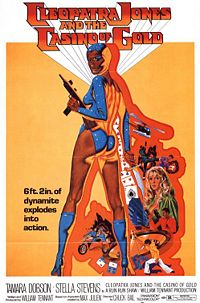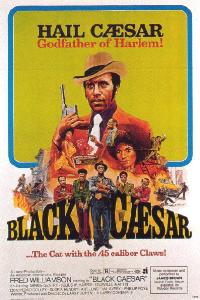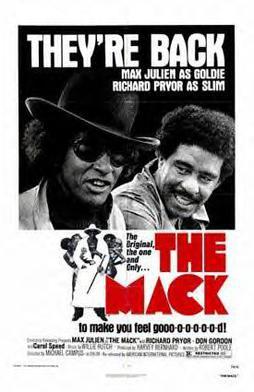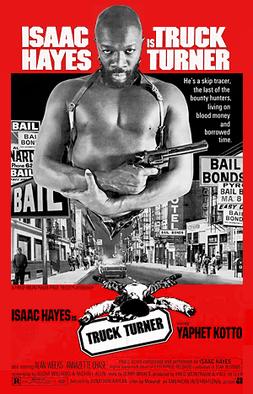

Eric Monte searches through receipts and notes he has kept on scraps of paper in a box.
Long after "lights out," he labors quietly at a keyboard. His "room" is a cubicle large enough to hold two cots, two lockers and a shared desk. Among his few personal items: a cellphone, a wireless laptop, a laser printer. "Home" is a shelter run by the Salvation Army; he is one of nearly 300 people who sleep in the former military depot in Bell every night.r Eric Monte, the last few years have been a blur of disasters. A series of strokes led to a spell of anti-seizure medicines and the loss of some memory. A year of crack cocaine abuse robbed him of money, dignity and a circle of Hollywood friends. Attempts to sell a self-published book drained the last of his savings. The laptop, he insists, holds the key to a comeback: 30 movie and book projects waiting to be pitched.And that just might be true.


Eric Monte is searched with a magnetic wand when he returns to the homeless shelter. He sometimes complains about the shelter's rules but says he never breaks them.(Luis Sinco / LAT)

The intensity of Eric Monte comes through in a taped interview for a TV Land production celebrating the hit 1970s sitcom "Good Times," which he helped create.(Luis Sinco / LAT)

Eric Monte walks outside the Salvation Army homeless shelter where he lives.(Luis Sinco / LAT)

Eric Monte works into the night at his laptop after 10 p.m. lights out.(Luis Sinco / LAT)
Jimmie Walker would have gone down in history as television's first young hustler, instead of a buffoon, if studio executives stuck to 'Good Times' creator Eric Monte's original script.
You say that you were blackballed from the industry -- why and how so? I pitched a show to [television producer] Marcy Carsey that eventually became the basis for 'The Cosby Show,' with a two-parent, middle-class family and a fine, professional wife. That was controversial, because back then Big Mama was the favored stereotype of black maternal figures. But no one was having it. I didn't want to fight white people, who had never been in a black neighborhood, let alone a black household, about how to depict blacks. I filed lawsuits against Norman Lear and others I didn't think were crediting or compensating me properly. I had run-ins with all the heavy people in TV about my work and black depictions on TV, and got labeled as being hard to work with. So what have you done since those days? Right now I'm in the process of publishing a book I wrote called 'Blueprint for Peace.' It tells how we can end war, eliminate taxes completely and reduce crime by 70 percent. You've also done some TV here and there, correct? Yes. I did an episode of 'The Wayans Brothers,' and 'Moesha.' That's it. I consider the 'Moesha' episode I did the absolute worst script I've ever written. What do you think the future is for blacks on TV? The current crop of black shows suck big time! But I'm getting ready to get back out there and since they've done nothing good, what I will do will blow minds and be big hits. There's no doubt about it. Glenn Turman 

Lawrence Hilton-Jacobs
The 1975 nostalgia picture Cooley High has aged well enough--inspiring the concept of Boyz II Men's debut album (which included a hit cover of the theme song, "It's So Hard to Say Goodbye to Yesterday") and recently growing in stature as a classic of the era's black cinema--to prompt this rerelease of its soundtrack album. Former Spinner G.C. Cameron's version of "Goodbye," guitarist Luther Allison's "Luther's Blues," and a handful of snippets from Freddie Perren's score are included, but the real meat of the disc lies in its selection of mid-'60s Motown classics. And among unsurprising choices by the Supremes, Temptations, and Four Tops, are two songs that connect most clearly to the film's themes of youthful abandon and innocence: the full giddy six-and-a-half minutes of Stevie Wonder's "Fingertips" and the fragile vow of the Miracles' "(You Can) Depend on Me."
1. Baby Love - Diana Ross & The Supremes
2. Fingertips - Stevie Wonder
3. I Can't Help Myself (Sugar Pie, Honey Bunch) - Four Tops
4. Stop! In The Name Of Love - Diana Ross & The Supremes
5. Luther's Blues - Luther Allison
6. Dancing In The Street - Martha & The Vandellas
7. Beechwood 45789 - The Marvelettes
8. OOO Baby Baby - Smokey Robinson & The Miracles
9. (You Can) Depend On Me - Smokey Robinson & The Miracles
10. Cleo's Mood - Jr. Walker & The All Stars
11. Money (That's What I Want) - Barrett Strong
12. You Beat Me To The Punch - Mary Wells
13. 2 Pigs And A Hog - Freddie Perren
14. My Girl - The Temptations
15. Sweet First Love - Freddie Perren
16. Three AM...I Love You Mama - Freddie Perren
17. (I'm A) Road Runner - Jr. Walker & The All Stars
18. Mickey's Monkey - Smokey Robinson & The Miracles
19. Haulin' - Freddie Perren
20. Cold Blooded - Freddie Perren
21. It's So Hard To Say Goodbye To Yesterday - G.C. Cameron
22. Reach Out I'll Be There - Four Tops
VA_-_Cooley_High_1975.rar Password = jamzforthesoul
Black Belt Jones
A hundred years from now, when cinema historians compare notes on America's late-20th-century fascination with martial arts films, they'll probably cite the era's most famous ass-kickers: Bruce Lee, Jackie Chan, Sammo Hung, Jet Li, Bruce Li and David Carradine (um, well, maybe not him). Hopefully they will also recall Jim Kelly, the well-chiseled, well-afro'd dude who broke the karate-chopping color barrier. Kelly is best known as Williams, the inner-city karate champ on the run from racist cops in Enter the Dragon. In that film, Kelly whooped much ass, bedded many chicks, and delivered some classic lines (e.g., "Man, you're right out of a comic book," and "Booool-shit, Mr. Han-Man!") before he was bludgeoned to death by the iron-fisted villain. Producers Fred Weintraub and Joseph Heller recognized Jim's badass screen presence and immediately fashioned a starring vehicle for him that fuses the chop-socky and Blaxploitation genres, both of which were happenin' in the 70's. This was only Kelly's third film, but it was his first and only leading-man role in a major studio movie.
Black Belt Jones is an amalgam of Shaft (a studly black hero-for-hire), Cleopatra Jones (a kung-fu fighting female heroine), The Chinese Connection (karate students avenging the murder of their master) and The Godfather (spaghetti slurping Italians who talk with their hands and say, "Mama mia!"). Jones (known as "B.B." or just "Belt" to his cigar-smoking boss) is some sort of freelance secret agent working for an unnamed government intelligence agency. In an opening sequence designed to show off his fighting skills, baby-blue jumpsuit and perfectly piqued hairstyle, B.B. thwarts a group of assassins (who look more like migrant farm workers, armed with junky guns and dull knives) attempting to ambush a Central American ambassador in the parking lot of a low-rent TV station. With a full orchestra playing a proto-disco tune on the soundtrack, B.B. dispenses with the thugs (leaping over cars, smashing their heads through windows and shooting one man in the ass), then wordlessly hops in his zippy Renault and speeds away. Too cool.
But, Belt's got principals. Specifically, he's opposed to getting killed. The head cheeze of the intelligence agency wants Belt to sneak into a big winery (actually a front for the Mob) and abscond with some very incriminating photographs; the government's already sent in three agents and each one ended up fermenting with the grapes in an oak vat. The boss offers Jones $100,000, but Belt don't play that dangerous tune. "Don't believe that bullshit about niggas being invisible," he says. Good point.
As luck (and screenwriting) would have it, Belt inevitably comes up against the mobsters anyway, after their black henchman Pinky (Malik Carter) and his gang begin harassing Belt's martial-arts mentor, Pop Byrd (Scatman Crothers, in a great toupee!). It seems the city of Los Angeles is constructing a new civic center -- in Watts! -- and the Mob wants in on the land-grab; Pop's dojo is located in the heart of some upwardly mobile ghetto real estate. A brawl ensues and Scatman teaches Pinky and his goons a two-fisted lesson, but when the baddies come back for revenge they accidentally kill the old man. When Sidney (Gloria Hendry), Pop's estranged daughter (and an ass-kickin' mama in her own right) blows into town seeking to avenge her dad's murder, and single-handedly beats the crap out of his gang, Pinky summons the aid of some "A-1 Bogards" (translation: "treacherous niggas") with names like Tango, Plummer and Jelly, who promptly kick the living shit out of everyone at the karate school and then kidnap Black Belt Jones' young protegee Quincy (Eric Laneuville, of "The White Shadow" fame), demanding a huge ransom or the deed to the karate school.
At last it's time for the titular hero to T.C.B.; realizing that Pinky is in cahoots with the Mob, Belt decides to kill two birds with one roundhouse kick. He hires a group of 15-year-old female trampoline artists to help him invade the Mob's winery (don't ask, it must be seen to be appreciated), where he steals a boatload of cash and the long-forgotten incriminating photos (soon forgotten again). Belt pays the ransom with the Mob's cash, then double-crosses Pinky and turns the mob against him; Pinky is about to sleep with the fishes when all the intellectually challenged goons realize they've been outsmarted by Black Belt. So, they head for his Malibu beach house and the requisite car chase begins, concluding at an industrial car wash with a protracted punch-and-kick-fest amid waist-high soap suds, and all the bad guys end up in the belly of a garbage truck.
Black Belt Jones is the greatest action film ever made. How can anyone possibly scoff at Scatman Crothers kicking ass on guys twice his size and half his age? How can anyone resist sexy Gloria Hendry stepping out of her heels and announcing, "I'll make you look like a sick faggot," before dealing out lethal karate moves. Or Ted ("Love Boat") Lange as a black militant and Marla ("The Jeffersons") Gibbs as a barmaid? A mafioso (Vincent Barbi) whose name sounds like "Tunasalad," so he goes by "Big Tuna" for short? Or high school coed gymnasts willing to risk their lives in a top-secret mob hideout raid for $5,000 (remember, Belt himself earlier refused the same job for 100 grand -- the hypocrite!)? Sure, you could drive a truck through the plot holes, but in what other film do the good guys shout "Let's go to McDonald's!" after outsmarting the villains?
Guys like Jim Kelly don't get paid to act, they're hired to kick butt, and Jim did it well (although, in several scenes where Belt wears a ski mask, a stunt double performed balletic kicks and twirls). That's why it's difficult to understand how he utterly faded from the Hollywood scene. Guys like Chuck Norris and Steven Seagal aren't thespians either, yet they routinely work in films and teleseries; Jim really hasn't done a lot since Black Belt Jones -- he appared with Jim Brown and Fred Williamson in films like Three the Hard Way (1974), Take a Hard Ride (1975, as a deaf mute Indian) and One Down, Two to Go (1983, a total suck-fest), and he made a couple of stinkers with Al Adamson including Black Samurai and Kill Factor (his most recent known film appearance is a cameo in Something Weird Video's Afros, Macks & Zodiacs). Nevertheless, Kelly has endured as a badass cult icon through the decades, and Black Belt Jones is the pinnacle of his flash-in-the-pan film career. |





 |
|
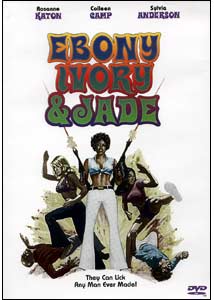

- Attachments:
Replies to This Discussion
-
You learn something new each day. Great story. So, Glenn Turman portrayed the REAL Eric Monte in Cooley High? I love that movie.
-
-
Yep...Glenn portrayed the real Preach-Eric Monte. That is one of my alltime favorite movies in this world. It is sooooo realistic and I grew up during the same period. I crack UP on the part when Preach and Cochise 'arrested' the prostitutes. LOL Too funny!!! Thanks for coming through ~
-
-
We could spend all day on this one!!!! LOL!!! This is a great montage Sole!
-
-
- play 01 coffy is the colour
- play 02 Priscilla's theme
- play 03 King George
- play 04 Aragon
- play 05 Coffy Sauna
- play 06 King's Last Ride
- play 07 Coffy baby
- play 08 Brawling Broads
- play 09 Escape
- play 10 Shining Symbol
- play 11 Exotic Dance
- play 12 Making Love
- play 13 Vittroni's Theme - King is Dead
- play 14 End Of Sugarman
-
© 2025 Created by Edie Antoinette.
Powered by
![]()










